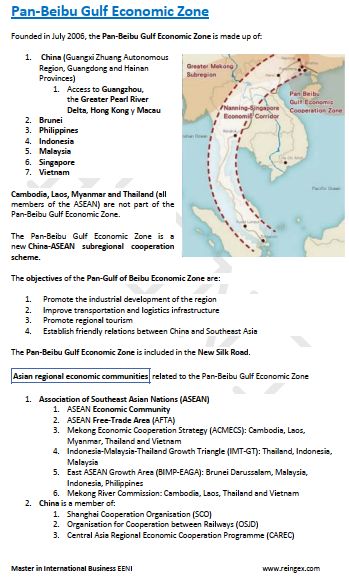Pan-Beibu Economic Zone
Pan-Beibu Gulf Economic Zone (China-ASEAN, Brunei, Philippines, Indonesia)
The objectives of the Pan-Gulf of Beibu Economic Zone are:
- Promote the industrial development of the region: China, Vietnam, Malaysia, Singapore, Indonesia, Philippines and Brunei
- Improve transportation and logistics infrastructure
- Promote regional tourism
- Establish friendly relations between China and Southeast Asia

Religions and Global Business -
Religious diversity
- Introduction to the Pan-Beibu Gulf Economic Zone
- Countries of the Pan-Beibu Gulf Economic Zone
- Main features of the Pan-Beibu Gulf Economic Zone
- The Pan-Beibu Gulf Economic Zone as a part of the New Silk Road
- Cooperation between ASEAN and China: "One Axis, Two Wings"
Pan-Beibu Gulf Economic Zone


The Subject «Pan-Beibu Gulf Economic Zone» is included within the curriculum of the following academic programs at EENI Global Business School:
Transportation Courses: Road Transport, Railway, Air, Multimodal.
Certificate in International Transport

Masters: International Transport, International Business.


Languages:  .
Summary in
.
Summary in  Zona Económica del Pan-Golfo de Beibu
Zona Económica del Pan-Golfo de Beibu
 Zone économique du Pan-Golfe de Beibu (Chine ASEAN)
Zone économique du Pan-Golfe de Beibu (Chine ASEAN)  Zona Económica do Pan-Golfo de Beibu (China-ASEAN).
Zona Económica do Pan-Golfo de Beibu (China-ASEAN).
Pan-Beibu Gulf Economic Zone.
Founded in July 2006, the Pan-Beibu Gulf Economic Zone is made up of:
- China (Guangxi Zhuang Autonomous Region, Guangdong and Hainan Provinces)
- Access to Guangzhou, the Greater Pearl River Delta, Hong Kong and Macau
- Brunei
- Philippines
- Indonesia
- Malaysia
- Singapore
- Vietnam
Cambodia, Laos, Myanmar and Thailand (all members of ASEAN) are not part of the Pan-Beibu Gulf Economic Zone.
The Pan-Beibu Gulf Economic Zone is a new China-ASEAN subregional cooperation scheme.
The Pan-Beibu Gulf Economic Zone is included in the New Silk Road.
Asian regional economic communities related to the Pan-Beibu Gulf Economic Zone.
- ASEAN
- ASEAN Economic Community
- ASEAN Free Trade Area
- Mekong Economic Cooperation: Cambodia, Laos, Myanmar, Thailand and Vietnam
- ASEAN Growth Triangle (IMT-GT): Thailand, Indonesia, Malaysia
- East ASEAN Growth Area: Brunei, Malaysia, Indonesia, Philippines
- Mekong River Commission: Cambodia, Laos, Thailand and Vietnam
- China is a member of:
- Shanghai Cooperation Organization
- Organization for Cooperation between Railways (OSJD)
- Central Asia Cooperation (CAREC)
- Greater Mekong Subregion: Cambodia, China, Laos, Myanmar, Thailand and Vietnam
- Indian-Ocean Rim Association
- Asia: Australia, Bangladesh, India, Indonesia, Iran, Malaysia, Sri Lanka, Singapore, and Thailand
- Middle East: Oman, the Emirates, and Yemen
- Africa: Comoros, Kenya, Madagascar, Mauritius, Mozambique, the Seychelles, South Africa, and Tanzania
- Asia-Pacific Trade Agreement: Bangladesh, China, India, South Korea, Laos, Mongolia and Sri Lanka
- APEC: Australia, Brunei Darussalam, Canada, Chile, China, South Korea,
United States, Philippines, Hong Kong, Indonesia, Japan, Malaysia,
México, New Zealand, Papua New Guinea, Peru, Russia, Singapore, Thailand,
Taiwan, Vietnam
- Trans-Pacific Partnership
Access to the Bangladesh-China-India-Myanmar Logistics Corridor.
Trade Agreements related to countries of the Pan-Beibu Gulf Economic Zone
- ASEAN
- ASEAN Trade Agreements: China, Canada, Australia-New Zealand, India, the EU, South Korea, Russia, the United States, Pakistan, Japan...
- Singaporean Trade Agreements: Australia, China, Jordan, India, Japan, Korea, New Zealand, Panama, Peru, EFTA, U.S...
- Indonesia has a Trade Agreement with India
- EFTA-Philippines
- Chinese Trade Agreements: ASEAN, Singapore, Pakistan, New Zealand, Peru, Costa Rica, APEC, SCO, Asia-Pacific Trade Agreement, the EU, Andean Community..
Main Asian institutions related to the Pan-Beibu Gulf Economic Zone
- Economic Commission for Asia (ESCAP)
- Asian Development Bank (ADB)
Main Islamic institutions related to the Pan-Beibu Gulf Economic Zone
- OCI
- Islamic Development Bank
The main Religions of the region of the Pan-Beibu Gulf Economic Zone are:
The Pan-Beibu Gulf Economic Zone belongs to:
- Sinic Economic Area
- Buddhist Economic Area
(c) EENI Global Business School (1995-2025)
Top of this page










 WhatsApp
WhatsApp